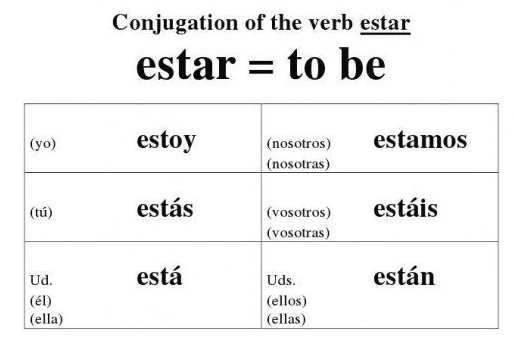"Estar" is one of the most useful verbs in Spanish. It can be used to describe the location, physical, mental, feelings, and emotional states. "Estar" means "to be" in English. In this lesson, we will learn how to use estar in Spanish and find out what are different forms of estar.
How to use estar in Spanish
1. To describe location, health, or any condition that is only temporary.
Let's take a look at some examples below:
Examples:
2. To describe feelings.
Estoy muy enojado - I am very angry
¿Estás cansado? - Are you tired?
3. To describe the condition of places or things.
La casa está limpia - The house is clean
Mi habitación está ordenada - My room is tidy
La tienda está cerrada - The shop is closed
You can see that those conditions, feelings, or states are temporary. Or in other words, a close shop will eventually open, a tidy room will soon become disorganized.
However, if you want to describe a permanent condition of something, you must use "ser".
Examples:
Sus ojos son azules - Her eyes are blue
Mi abuelo es profesor - My grandpa is a teacher
See: How to use ser in Spanish for more information.
Some common adjectives that are often used with estar:
- caliente - hot
- ordenado - tidy
- helado - icy
- oscuro - dark
- limpio - clean
- sucio - dirty
- lleno - full
- vacio - empty
- triste - sad
- nervioso - nervous
- feliz - happy
- cansado - tired
- ocupado - busy
- enojado - angry
- preocupado - worried
- adolorido - sore
You may want to see: Verbs like gustar
Forms of estar in Spanish
Present tense forms of estar
| Yo (I) | estoy |
| Tú (You) | estás |
| Ud., él, ella (He/She/It) | está |
| Nosotros/as (We) | estamos |
| Vosotros/as (You all) | estáis |
| Uds., ellos, ellas (They) | están |

Forms of estar in Spanish
See estar conjugation for all forms of estar.
How to ask someone how do they feel in Spanish?
| Yo | ¿Cómo estoy? | How am I? |
| Tú | ¿Cómo estás? | How are you? (e.g., to a friend) |
| Ud. | ¿Cómo está Ud? | How are you? (e.g., to your boss) |
| Nosotros/as | ¿Cómo estamos? | How are we? |
| Vosotros/as | ¿Cómo estáis? | How are you? (e.g. to a group of friends) |
| Uds. | ¿Cómo están Uds.? | How are you? (e.g., to a group of co-workers) |
Example Sentences:
¿Cómo está tu madre? - How is your mother?.
Ella está muy cansada por el viaje - She is very tired because of the trip.
¿Cómo estoy, Doctor? - How am I, Doctor?.
We hope that our lesson today can help you know how to use estar in the right context.
